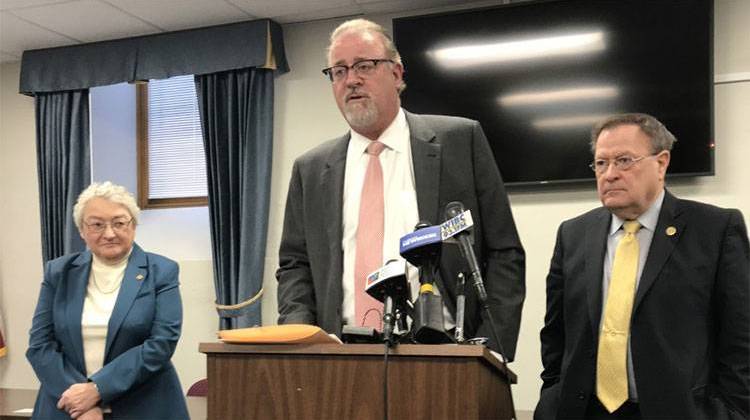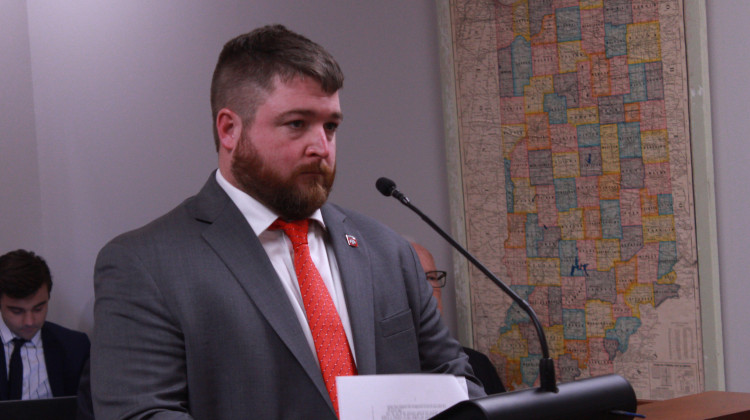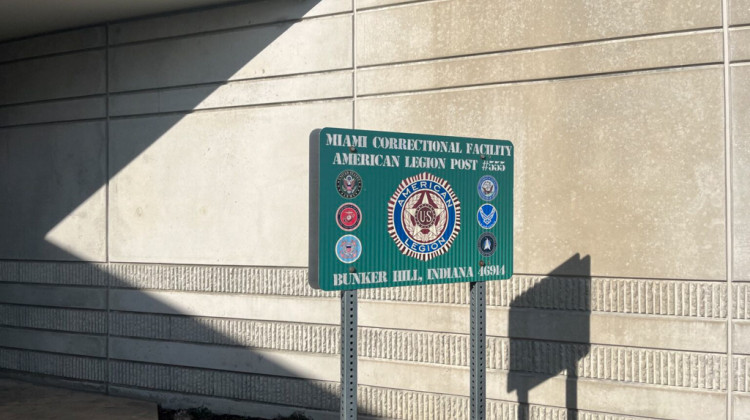
Senate Republican leaders discuss the hate crime bill's failure to advance in 2018. Those leaders, from L to R: Sen. Sue Glick (R-LaGrange), the bill's author, Senate President Pro Tem David Long (R-Fort Wayne), and Sen. Mike Young (R-Indianapolis), the committee chair.
Brandon Smith/IPB NewsIndiana will remain one of five states without a hate crimes law after the Senate Republican caucus opted not to take a vote on the bill this session.
The hate crimes bill would have allowed a judge to impose harsher penalties if the crime was committed in part because of a victim’s characteristics. One of those characteristics was gender identity – which bill author Sen. Sue Glick (R-LaGrange) says was a significant sticking point.
“I really believe that many people read that list and see, in their minds, it only applies to this race or this religion or these people,” Glick says.
Glick argues the language of her bill encompasses all people who might need protection.
A Senate committee didn’t vote on the bill – which Senate President Pro Tem David Long (R-Fort Wayne) says was a decision of his caucus. Still, he says he’ll push for the bill to come back next year and notes some issues take years to reach the finish line.
“I think we need to find some consensus on this. We’re not going to satisfy everyone, obviously,” Long says.
But proponents of the hate crimes bill say legislative leaders should be “ashamed.” Byron Ratcliffe, with the Indianapolis NAACP, scoffs at Long’s suggestion.
“They said that last year. They’ll say it next year,” Ratcliffe says. “How long is it going to take?”
Ratcliffe says it’s cowardly for the Senate not to take a public vote on the bill.
“You ought to be strong enough to say, ‘I stood against the bill and this is why,’ or ‘I support the bill and this is why.’ And if you can’t do that, then why be a legislator?” Ratcliffe says.
Religious conservative groups opposed the bill. And American Family Association of Indiana Executive Director Micah Clark says the bill’s death is a victory.
“Although I would like to see this issue done and over with. I would’ve preferred that they accepted our compromise language,” Clark says.
That language would have been a much broader provision that doesn’t list out individual characteristics.
“We believe that a hate crimes bill is possible if it protects every victim of a crime, or any victim of a hate crime – not just those on a favored list,” Clark says.
Supporters of the bill argued during public testimony that passing such legislation would help the state’s bid to attract Amazon as the tech giant looks to locate its second headquarters. Long says the bill’s failure should have no effect.
“Nor do I think we should tailor all of our legislation in the hopes that a company would locate here,” Long says. “I would hope they’d be coming to Indiana because we are a welcoming state, because we have a great economy and we have low cost of living, and we have a booming tech industry here as well.”
Hate crimes legislation has been proposed – and failed – for decades.
 DONATE
DONATE







 Support WFYI. We can't do it without you.
Support WFYI. We can't do it without you.